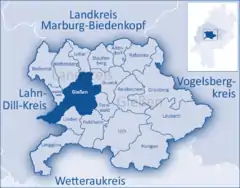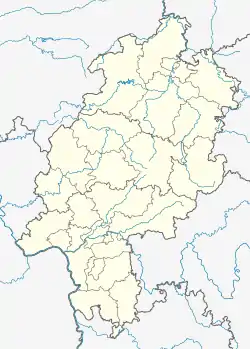Giessen
Giessen, spelled Gießen in German (German pronunciation: [ˈɡiːsn̩] (![]() listen)), is a town in the German federated state (Bundesland) of Hesse, capital of both the district of Giessen and the administrative region of Giessen. The population is approximately 90,000, with roughly 37,000 university students.
listen)), is a town in the German federated state (Bundesland) of Hesse, capital of both the district of Giessen and the administrative region of Giessen. The population is approximately 90,000, with roughly 37,000 university students.
Giessen
Gießen | |
|---|---|
 Main building of Justus Liebig University | |
 Coat of arms | |
Location of Giessen within Giessen district  | |
 Giessen  Giessen | |
| Coordinates: 50°35′0″N 8°40′0″E | |
| Country | Germany |
| State | Hesse |
| Admin. region | Giessen |
| District | Giessen |
| Subdivisions | 6 Stadtteile |
| Government | |
| • Lord mayor (2021–27) | Frank-Tilo Becher[1] (SPD) |
| Area | |
| • Total | 72.56 km2 (28.02 sq mi) |
| Elevation | 159 m (522 ft) |
| Population (2020-12-31)[2] | |
| • Total | 90,131 |
| • Density | 1,200/km2 (3,200/sq mi) |
| Time zone | UTC+01:00 (CET) |
| • Summer (DST) | UTC+02:00 (CEST) |
| Postal codes | 35390–35398 |
| Dialling codes | 0641, 06403 |
| Vehicle registration | GI |
| Website | www.giessen.de |
The name comes from Giezzen, as it was first referred to in 1197, which refers to the position of the town between several rivers, lakes and streams. The largest river in Giessen is the Lahn, which divides the town in two parts (west and east), roughly 50 kilometres (31 miles) north of Frankfurt am Main. Giessen is also home to the University of Giessen.
In 1969, the town hosted the ninth Hessentag state festival.
History
Giessen came into being as a moated castle in 1152 built by Count Wilhelm von Gleiberg,[3] although the history of the community in the northeast and in today's suburb called "Wieseck" dates back to 775. The town became part of Hesse-Marburg in 1567, passing to Hesse-Darmstadt in 1604. The University of Giessen was founded in 1607. Giessen was included within the Grand Duchy of Hesse created in 1806 during the Napoleonic Wars. After the First World War, it was part of the People's State of Hesse.
During the Second World War, a subcamp of the Buchenwald concentration camp was in the Heil- und Pflegeanstalt Licher Straße.[4][5][6] Heavy bombing destroyed about 75 percent of Giessen in 1944, including most of the town's historic buildings. It became part of the modern state of Hesse after the war.
In 1977, Giessen was merged with the neighbouring city Wetzlar to form the new city of Lahn. However, this attempt to reorganize the administration was reversed in 1979. It was part of the Darmstadt region (regierungsbezirk) between 1945 and 1981, until the Giessen (region) was founded on 1 January 1981.
A U.S. military base was located in Giessen after the Second World War. The U.S. Army Garrison of Gießen had a population of up to 10,000 American soldiers and their families. Gießen was also the site of the central US army depot for all of Europe as well as the site of a special ammunition depot.[7] The base is a converted German Army Air Field which is reflected in some of the buildings including the housing area. A theatre, known as the Keller Theatre, is a converted German Army Officers' Club. As of 28 September 2007, the Giessen Depot and all other U.S. facilities in the greater Giessen area were returned to local German authorities. The former U.S. Army buildings were used to house refugees after the large influx of 2016.
After the war, the city was twinned with Winchester, UK.[8]
| Largest groups of foreign residents | |
| Nationality | Population (2011) |
|---|---|
| 1,922 | |
| 569 | |
| 425 | |
International relations
|
Points of interest
- Akademischer Forstgarten Gießen, botanical gardens
- Botanischer Garten Gießen, established in 1609, is the oldest botanical garden in Germany still at its original location.
- Old Cemetery, (German: Alter Friedhof), is the resting place of Wilhelm Conrad Röntgen and Hugo von Ritgen.
- Liebig-Museum was established in 1920 to honor the chemist Justus von Liebig.
- Mathematikum was established in 2002, offering a wide variety of mathematical hands-on exhibits.
- University of Giessen
- Rubber Island is a residential area near the Lahn River.
Sport
Giessen is home to the basketball club Giessen 46ers, five-time champion of the Basketball Bundesliga. Its home games take place at the Sporthalle Gießen-Ost. Also, Giessen has an American football team called Giessen Golden Dragons.
Religion
The Catholic Scouts of Europe were founded in Giessen in 1975.[12]
Gallery
.jpg.webp) Historical drawing of the marketplace, 1844
Historical drawing of the marketplace, 1844 Historical drawing of the Akademischer Forstgarten Gießen, 1877
Historical drawing of the Akademischer Forstgarten Gießen, 1877 Botanical garden Gießen
Botanical garden Gießen Theater Gießen
Theater Gießen Architecture in Gießen
Architecture in Gießen_01.JPG.webp) Röntgen memorial
Röntgen memorial Liebig laboratory, 1909
Liebig laboratory, 1909 Multiway pedestrian bridge "Elefantenklo" ("Elephant loo")
Multiway pedestrian bridge "Elefantenklo" ("Elephant loo")
Notable people
- Samuel Adler (1809–1891), noted rabbi in the United States, attended the University of Giessen[13]
- Annika Beck (born 1994), professional tennis player
- Stefan Bellof (1957–1985), Formula One and Sportscar driver, who was killed during a race held in Spa-Francorchamps
- Christa Blanke (born 1948), theologist, founder of Animals' Angels e.V.
- Volker Bouffier (born 1951), politician (CDU)
- Helge Braun (born 1972), politician (CDU)
- Georg Büchner (1813–1837) studied two years at the University of Gießen
- Daniel Davari (born 1988), Iranian footballer.
- Ernst Dieffenbach, born Johann Karl Ernst Dieffenbach (1811–1855), German physician, geologist and naturalist
- Georg Christian Dieffenbach (1822–1901), German poet and theologian
- Johann Friedrich Dieffenbach (1792–1847), German surgeon
- Walter Dornberger (1895–1980), rocket scientist
- Peter Düttmann (1923–2001), Luftwaffe Ace
- Landgravine Elisabeth Amalie of Hesse-Darmstadt (1635–1709), Electress Palatine
- Charles Friedek (born 1971), triple jumper, gold medallist at the 1999 World Championships in Athletics
- Jesko Friedrich (born 1974), comedy television actor and writer
- Adolph Hansen (1851–1920), botanist and professor at University of Giessen
- Fritz Pfeffer (1889–1944), dentist, hid in the Anne Frank House during WWII
- Fritz Heichelheim (1901–1968), economic historian
- August Wilhelm von Hofmann (1818–1892), chemist
- Juli, rock band
- Friedrich Kellner (1885–1970), Chief Regional Auditor in Giessen 1948–1950, and Chief Justice Inspector of Laubach, where he wrote his secret WWII diary. The Holocaust Research Unit of Justus Liebig University of Giessen has established the Kellner Project
- Karl Kling (1910–2003), racing driver and head of Mercedes-Benz Motorsport
- Jonathan Koch (born 1985), rower
- Harald Lesch (born 1960), physicist, astronomer, natural philosopher, author, television presenter, professor of physics
- Chris Liebing (born 1968) techno/electronic music producer and DJ
- Justus von Liebig (1803–1873), chemist, professor. The official name of the University of Giessen is now Justus Liebig University
- Wilhelm Liebknecht (1826–1900), founder of the Social Democratic Party of Germany, was born on March 29, 1826, in Giessen
- Sigmund Livingston (1872–1946), American lawyer, founder and first president of the Anti-Defamation League
- Christopher Ludwick (1720–1801) Baker General for the American Revolutionary War Army – Philadelphia
- Alfred Milner (1854–1925), British statesman
- Demis Nikolaidis (born 1973), Greek footballer
- James J. O'Donnell (born 1950), American scholar and university administrator, born in Giessen
- Albert Osswald (1919–1996), politician
- Wilhelm Conrad Röntgen (1845–1923), physicist, professor of physics from 1879 until 1888 at the University of Giessen. He was buried at the "Alte Friedhof", where his tomb can still be found
- Johann Georg Rosenmüller (1736–1815), professor of theology at the university
- Jochen Schropp (born 1978), German actor and television entertainer
- Til Schweiger (born 1968), actor, director and producer. Grew up, went to school and started studying in Giessen
- Wilhelm Sievers (1860–1921), geographer, explorer, professor at the university
- Henrietta Skelton (1839/1842–1900), social reformer, writer, organizer, lecturer
- Dieter Strack, retired German professional basketball player
- Marie Wittich (1868–1931), opera singer
- Willy Zschietzschmann (1900–1976), Classical archeologist and author
Education
- MBML: The International Graduate Programme "Molecular Biology and Medicine of the Lung" of the University of Giessen Lung Center
- University hospital Giessen und Marburg
- Mittelhessen University of Applied Sciences
- University of Giessen
Manisch
Manisch is a dialect of rotwelsch spoken in and around Giessen by people in lower income neighbourhoods, some of which are known as "Eulenkopf", "Gummiinsel", "Heyerweg" and "Margaretenhütte". Approximately 700–750 residents spoke the dialect fluently as of 1976.[14] Although the dialect still influences the Giessen vernacular, it is nearly extinct in terms of fluent speakers.
Geography
Climate
Climate in this area has mild differences between highs and lows, and there is adequate rainfall year-round. The Köppen Climate Classification subtype for this climate is "Cfb". (Marine West Coast Climate).
| Climate data for Giessen | |||||||||||||
|---|---|---|---|---|---|---|---|---|---|---|---|---|---|
| Month | Jan | Feb | Mar | Apr | May | Jun | Jul | Aug | Sep | Oct | Nov | Dec | Year |
| Average high °C (°F) | 3 (38) |
6 (42) |
10 (50) |
15 (59) |
19 (67) |
23 (73) |
25 (77) |
24 (76) |
19 (67) |
14 (57) |
8 (46) |
4 (39) |
14 (58) |
| Average low °C (°F) | −1 (31) |
−1 (31) |
2 (35) |
4 (40) |
8 (47) |
12 (53) |
13 (56) |
13 (56) |
9 (49) |
7 (44) |
3 (38) |
1 (33) |
6 (43) |
| Average precipitation mm (inches) | 46 (1.8) |
36 (1.4) |
38 (1.5) |
36 (1.4) |
53 (2.1) |
56 (2.2) |
66 (2.6) |
56 (2.2) |
48 (1.9) |
48 (1.9) |
51 (2) |
53 (2.1) |
600 (23.5) |
| Source: WeatherOnline [15] | |||||||||||||
See also
- Giessen station
- Giessen 46ers — Basketball club
- Giessen emigration society — founded 1833
References
- Notes
- Direkt gewählte (Ober-) Bürgermeister/-innen der hessischen Städte und Gemeinden, accessed 8 March 2022.
- "Bevölkerung in Hessen am 31.12.2020 nach Gemeinden". Hessisches Statistisches Landesamt (in German). June 2021.
- Chisholm, Hugh, ed. (1911). . Encyclopædia Britannica. Vol. 12 (11th ed.). Cambridge University Press. p. 4.
- Edward Victor. Alphabetical List of Camps, Subcamps and Other Camps.
- 1933-1945 Lager G. Tenhumberg Reinhard. Retrieved 2014-08-03.
- Hessian Regional History Information System (LAGIS)
- Das US-Depot als Ort der Mythen: Reportage und Führung. Gießener Allgemeine, 27. Juli 2015 (German)
- "USAG Giessen Folds Up Tent". Retrieved 2008-05-08.
- "Gießen: Städtepartnerschaften" [Giessen: Twin towns] (in German). Stadt Gießen. Archived from the original on 2013-04-13. Retrieved 2013-08-01.
- "Netanya – Twin Cities". Netanya Municipality. Archived from the original on 2013-02-01. Retrieved 2013-08-01.
- "Twin Towns in Hampshire". Www3.hants.gov.uk. Archived from the original on 2009-11-30. Retrieved 2009-11-06.
- "Pfadfinder – KPE".
- Who Was Who in America, Historical Volume, 1607–1896. Marquis Who's Who. 1967.
- Hans-Günter Lerch, "Tschü lowi...Das Manische in Gießen", 1976/2005, pages 16-22.
- "weatheronline.de". WeatherOnline. 2013. Retrieved on July 9, 2020.
External links
 Giessen travel guide from Wikivoyage
Giessen travel guide from Wikivoyage- City Services Giessen (SWG)
- Express Magazine – Current events and news from Giessen